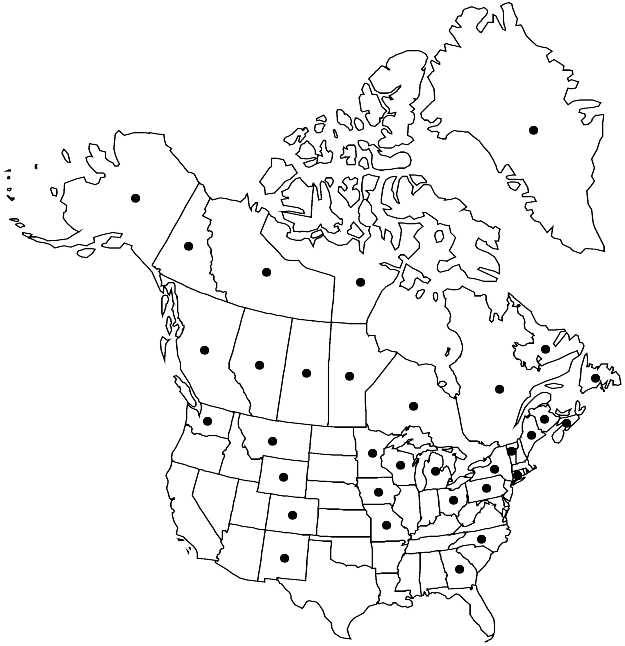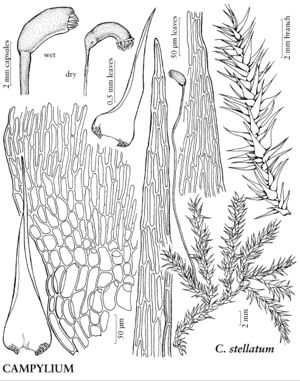Difference between revisions of "Campylium stellatum"
Meddel. Grønland 3: 328. 1887.
FNA>Volume Importer |
FNA>Volume Importer |
||
| Line 32: | Line 32: | ||
|elevation=low to high elevations | |elevation=low to high elevations | ||
|distribution=Greenland;Alta.;B.C.;Man.;N.B.;Nfld. and Labr.;N.W.T.;N.S.;Nunavut;Ont.;Que.;Sask.;Yukon;Alaska;Colo.;Conn.;Ga.;Iowa;Maine;Mich.;Minn.;Mo.;Mont.;N.Mex.;N.Y.;N.C.;Ohio;Pa.;Vt.;Wash.;Wis.;Wyo.;Mexico;West Indies (Haiti);Central America (Guatemala);Eurasia;Pacific Islands (New Zealand). | |distribution=Greenland;Alta.;B.C.;Man.;N.B.;Nfld. and Labr.;N.W.T.;N.S.;Nunavut;Ont.;Que.;Sask.;Yukon;Alaska;Colo.;Conn.;Ga.;Iowa;Maine;Mich.;Minn.;Mo.;Mont.;N.Mex.;N.Y.;N.C.;Ohio;Pa.;Vt.;Wash.;Wis.;Wyo.;Mexico;West Indies (Haiti);Central America (Guatemala);Eurasia;Pacific Islands (New Zealand). | ||
| − | |discussion=<p>Shoots of Campylium stellatum often look like small stars when seen from above in the field. The species is closely related to C. protensum, from which it differs in having a more erect growth, slightly larger size, and relatively shorter leaf acumen. Paraphyllia have never been seen in C. stellatum, whereas scattered plants of C. protensum have a few paraphyllia.</p> | + | |discussion=<p>Shoots of <i>Campylium stellatum</i> often look like small stars when seen from above in the field. The species is closely related to <i>C. protensum</i>, from which it differs in having a more erect growth, slightly larger size, and relatively shorter leaf acumen. Paraphyllia have never been seen in <i>C. stellatum</i>, whereas scattered plants of <i>C. protensum</i> have a few paraphyllia.</p> |
|tables= | |tables= | ||
|references= | |references= | ||
| Line 55: | Line 55: | ||
|publication year=1887 | |publication year=1887 | ||
|special status=Selected by author to be illustrated | |special status=Selected by author to be illustrated | ||
| − | |source xml=https://jpend@bitbucket.org/aafc-mbb/fna-data-curation.git/src/ | + | |source xml=https://jpend@bitbucket.org/aafc-mbb/fna-data-curation.git/src/8f726806613d60c220dc4493de13607dd3150896/coarse_grained_fna_xml/V28/V28_451.xml |
|genus=Campylium | |genus=Campylium | ||
|species=Campylium stellatum | |species=Campylium stellatum | ||
Revision as of 17:05, 18 September 2019
Plants medium-sized, green to yellowish or brownish. Stems erect, irregularly branched or sometimes irregularly pinnate; paraphyllia absent. Stem leaves spreading or ± squarrose, 1.7–2.8 × 0.7–1.2 mm; base erect to erect-spreading, cordate or rounded-triangular; acumen frequently differentiated, constituting 40–65% (rarely 33–40% in Arctic plants) leaf length. Sexual condition dioicous.
Habitat: Intermediately mineral-rich fens, lake and river shores
Elevation: low to high elevations
Distribution

Greenland, Alta., B.C., Man., N.B., Nfld. and Labr., N.W.T., N.S., Nunavut, Ont., Que., Sask., Yukon, Alaska, Colo., Conn., Ga., Iowa, Maine, Mich., Minn., Mo., Mont., N.Mex., N.Y., N.C., Ohio, Pa., Vt., Wash., Wis., Wyo., Mexico, West Indies (Haiti), Central America (Guatemala), Eurasia, Pacific Islands (New Zealand).
Discussion
Shoots of Campylium stellatum often look like small stars when seen from above in the field. The species is closely related to C. protensum, from which it differs in having a more erect growth, slightly larger size, and relatively shorter leaf acumen. Paraphyllia have never been seen in C. stellatum, whereas scattered plants of C. protensum have a few paraphyllia.
Selected References
None.
